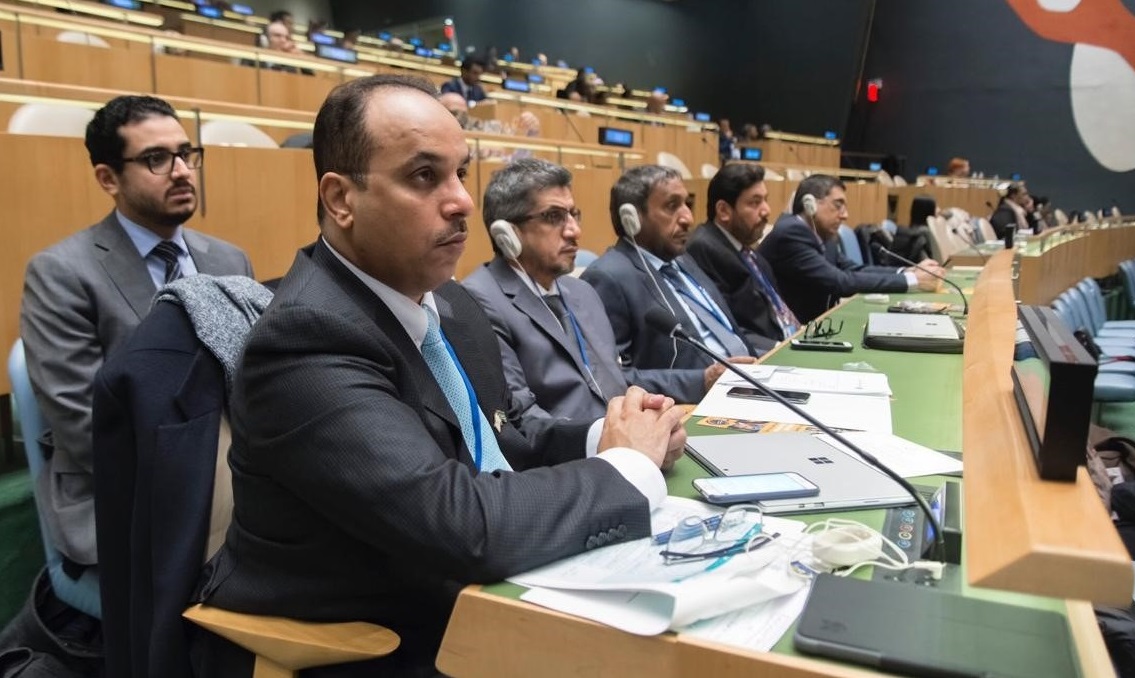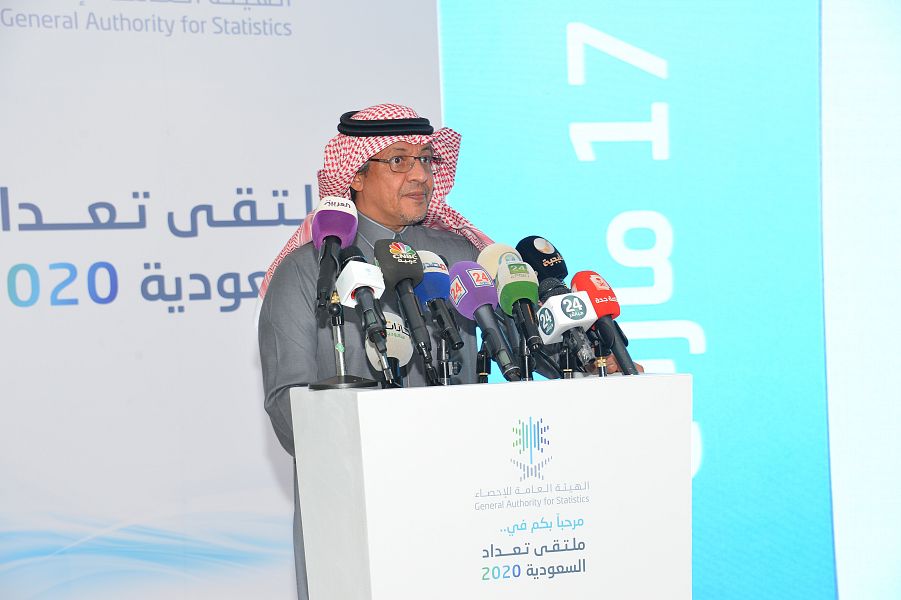
الهيئة العامة للإحصاء: المملكة على بُعدِ عامٍ من تعداد السعودية 2020
Tuesday Evening March 17th, 2020 is the Beginning of the Fifth Census’ Actual Enumeration
GASTAT: Saudi Arabia is One Year Away Until the Saudi Arabia Census 2020
The General Authority for Statistics (GASTAT) revealed that the fifth census of population, housing and establishments in Saudi Arabia “Saudi Arabia Census 2020” will start on Tuesday, March 17th, 2020, which is the beginning of the actual enumeration “evening of time reference”. The census will provide a broad statistical database to be used as a reliable basis when conducting studies and research required by the development programs and plans in Saudi Arabia and the Saudi Vision 2030. Furthermore, it provides statistical data and indicators to measure changes in population characteristics over time, conducts local, regional and international comparisons, and review and evaluate future population estimates.
In this Census, GASTAT will rely on different methods to ensure getting accurate information through linking data together in addition to the cooperation with the National Information Center and the Saudi Post. This is done in accordance with the preparations made by GASTAT and their partners in order to implement the “Saudi Arabia Census 2020”. This census will be different from previous censuses due to the change in the enumeration method by integrating the register-based data with field data.
The official spokesman of GASTAT , Mr. Taiseer Al-Mufrrej, said that GASTAT has completed the updating of the populated areas directory in all regions of the Kingdom, in addition to updating the postal addresses in several administrative regions, which are: Makkah, Madinah, Jazan, Najran, Al-Baha, the Northern Border, Tabuk, Hail and Al-Qassim. He also explained that during the month of Sha'ban the postal addresses in the city of Riyadh and the eastern region will be updated. He also added that the preparation of the operational plans for manpower, training, and publishing has been initiated. This is the first phase of the Saudi Arabia Census 2020, which will be followed by the second phase (the actual enumeration phase), then the third phase (data processing phase) then finally the announcement of the results.
The first official census in Saudi Arabia was conducted in 1394H. (1974), then the second was conducted in 1413H. (1992), followed by the third in 1425H.(2004). Finally, the fourth census made by the Central Department of Statistics and Information prior to the transformation into the General Authority for Statistics was conducted in 1431H. (2010). The total population in the 2010 census was (27,136,977) people.

المملكة تختتم مشاركتها في أعمال الدورة الـ (50) للجنة الإحصائية للأمم المتحدة
Saudi Arabia Ends its Participation in the Works of the United Nations Statistical Commission (50th Round)
Yesterday 9, Mar 2019, Saudi Arabia Ends its Participation in the works of the United Nations Statistical Commission (50th Round). It started last Tuesday until yesterday evening at the United Nations headquarter in New York City. The delegation was headed by his Excellency Dr. Fahad bin Sulaiman Altekhaifi, president of the General Authority for Statistics. The participation was an extension of the Authority strategy for international collaboration, Altekhaifi said. Also, to benefit from the best statistical practices to be reflected on the development of the statistical sector in Saudi Arabia, he added. Moreover, Saudi Arabia has reviewed a number of development axes for the statistical sector. The works of the (50th) meeting dealt with a number of important topics related to the role of statistical data in the development process, the fundamental principles of official statistics, open data and national quality assurance frameworks, regional statistical development, discussing all the matters related to national accounts and price, international trade statistics, industrial statistics, and statistics related to disasters, in addition to education statistics.
the General Authority for Statistics of Saudi Arabia will publish a statistical report of the goals of sustainable development indicators with social, economic and environmental dimensions in time series that will ensure measuring the progress in achieving them, President of GASTST clarified. Saudi Arabia is working alongside with international organizations of the indicators to measure all the indicators correctly, he added.
The Authority participated in the Works of the United Nations Statistical Commission through a variety of themes and issues, including: educational Statistics which indicated that training and education sector in the kingdom of Saudi Arabia witnesses an increasing attention under Saudi Arabia's Vision 2030, and national transformation program which has developed many initiatives related to the development of education and training and aims to raise the quality of education and training outputs, make them relevant to the labor market and encourage creativity and innovation in scientific research as the policy-making and planning in this field requires accurate and comprehensive data to support decision makers. It has also developed register-based data of education, through conducting a household survey regularly every three years for training and education.
General Authority for Statistics will provide a quality services in order to reach the expectations and the needs. It will also provide high quality services through statistical data collection as well as analyzing, keeping and publishing the data. Also, through implementing and improving the quality system. It seeks to fully implement the National Accounts System 2008 which helped in developing many forms of economic and household surveys to assist obtaining the necessary data to apply all the accounts in accordance with the concepts of the System of National Accounts 2008, GASTAT is also working to build national accounts and economic statistics capabilities to enable them to carry out their tasks in accordance with the recommendations of international standards.
GASTAT also stressed on the importance of understanding the system of national accounts for urgent economic developments, and prepare accessories to the System which clarifies how to address these developments through theoretical framework and applied framework as well as show experiences of countries.
It is worth mentioning that Saudi Arabia has been chosen with (11) countries globally to fill the membership of the board of directors of the International Comparison Program in the United Nation of the period 2017-2019, based on the vote of the Statistics Division of the United Nation and Data Development Group of the international bank to represent the countries of Western Asia. Saudi Arabia has been chosen to this membership as appreciation to the positive role of GASTAT in various statistical programs organized by the United Nation. The formation of the administrative structure of the International Comparison Program includes: United Nation Statistical Commission, management board (GASTAT membership), the joint work teams among agencies, consulting and technical coordination committees, as well as the implementing international agency (World Bank), regional offices, the Statistical Office of the European Union (Euro stat), the Organization of Cooperation and Development, and the participating national statistical offices.

الهيئة العامة للإحصاء تعلن عن ليلة الإسناد الزمني لتعداد 2020

الهيئة العامة للإحصاء تشارك في الاجتماع الرابع لمجلس الإدارة لبرنامج المقارنات الدولية 2019م
GASTAT Participates in ICP Board of Directors Fourth Meeting (2019)
The General Authority for Statistics (GASTAT) has participated in the International Comparison Program (ICP) board of directors fourth meeting held in New York, USA, on Sunday Jumada Al-Thani 26th, 1440 H. (March 3rd, 2019). Dr Fahad Altekhaifi, the President of GASTAT, indicated that the board of directors comprises eleven state members including the Kingdom of Saudi Arabia which represents West Asia. It discussed the progress reached so far in the implementation of the ICP of 2017, the communication and dissemination strategy, the preparation for the forthcoming session in 2020 in addition to the discussion of several other topics relevant to statistical work.
Dr Altekhaifi also added that the selection of Saudi Arabia to be a member in the ICP board of directors for the years 2017-2019 comes as a recognition of GASTAT positive role in the various statistical programs organized by the United Nation. He also said that it is an affirmation of the Kingdom’s active role in the world’s statistical map, and reflects the results of the statistical sector strategic transformation in the Kingdom, which is supported by the government due to its role in supporting national development decisions. The World Bank's International Comparison Program is a global statistical partnership program based on a statistical system that is integrally connected to the economic analysis. It uses statistical methods to derive the necessary data to calculate the PPP for about 200 countries and economies worldwide. It will facilitate the use of PPP as currency converters, which will allow the comparison of the total economic indicators and the economic conditions of countries worldwide which helps to allow users to track progress towards achieving sustainable development goals and effectively guide programs towards their goals. The program is geographically divided into six regions under the supervision of the ICP office at the World Bank.
Altekhaifi confirmed that the program’s work and results will help shape policies for global comparison to support statistical products of the participating countries. It will also enable GASTAT to access the best statistics global practices to improve and develop the statistical work.
It is noteworthy to mention that the ICP board of directors is compiled of, chairpersons, directors and leading experts in 11 statistical agencies participating in the program. They are distributed according to the regional areas: Africa, Asia, Pacific Islands, Latin America, the Caribbean, West Asia, Commonwealth of Independence States, European Union, non-European Union States, members of the organization for Economic Cooperation and Development, representatives of the International Monetary Fund, World Bank, UN Statistics Division, and the Inter-Agency Coordination Group.
